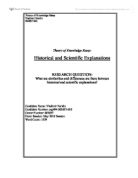What similarities and differences are there between historical and scientific explanations?
Theory of Knowledge Essay
Vladimir Nardin
003057-035
Theory of Knowledge Essay:
Historical and Scientific Explanations
RESEARCH QUESTION:
What are similarities and differences are there between historical and scientific explanations?
Candidate Name: Vladimir Nardin
Candidate Number: czg494 003057-035
Center Number: 003057
Exam Session: May 2010 Session
Word Count: 1529
What similarities and differences are there between historical and scientific explanations?
In Theory of Knowledge, an explanation can be seen as a set of justification or reasons that accounts for the occurrence of an event/factor. The similarities and differences of scientific and historical have to analyzed and evaluated in the context of their origins, methodologies and inaccuracies regarding a specific factor/event. Furthermore, this can only concretized by the use of examples of different historical and scientific explanations. Essentially, historical explanations aim at understanding the unfolding of past events through the use of historiography (primary and secondary sources). In contrast, a scientific explanation through experiments and trial and error aims at explaining how the natural world around us functions presently. Even though both explications emanate from different areas of knowledge, scientific and historical explanations present a similar purpose of justifying ones belief regarding an event or factor.
A fundamental similarity that exists between historical and scientific explanation is that they both emanate/originate from an observation made regarding a specific event or factor. An observation can be defined as a statement, remark or comment of an individual on something he has seen, noticed or heard. Furthermore, the collection of these observation for both explanations depends on our five senses which are physiological methods of (i.e.: sight, hearing, taste, smell and touch) Nevertheless, in science you begin by observing and classifying the relevant data to search for a pattern and formulate a hypothesis with regard to the different disciplines of science (i.e.: physics, biology, physics and etc). Any observation made for a scientific explanation will concentrate on explaining present natural concepts that occur around us. In contrast, historical explanations and observation with their focus on the past do not seem to have an immediate practical value. It is justifiable that historical explanations give us a sense of identity, a defense against propaganda and enriches our understanding of human nature. Whilst a scientific explanation will describe and explain how the world around us functions. Thus observations for both explanations are set different levels and involve diverse observations. A historical explanation from an observation will study the present traces of the past or evidence. Furthermore, any observation made for a historical explanation will be subject to the historian’s education, nationality, culture, religion and beliefs thus eroding its neutrality “What is history but a fable agreed upon? (Napoleon Bonaparte, 1769-1821)” Thus it involves the subjective immersion of the historian into the subject under examination and this can only be done through two senses, sight and hearing. For example, our knowledge of the wars between Persia and Greece in the fifth century BCE is based on a single, quite unreliable source – the Greek Historian Herodotus (c. 485 – 420 BCE). Written evidence is the fundamental feature of any historical explanation but still submitted to doubt as it is only one persons viewpoint on a matter. Even though, a scientific explanation requires a background of careful observation necessitating all five senses, technology and mathematics play a central role in the development of scientific ideas. For example, Newton’s law of gravity not only fitted the observational data, but could also be expressed in precise mathematical terms. Furthermore, the Hubble telescope served to observe distant galaxies, stars and planets. Whereas a historical explanation can also employ technology (i.e.: in archeological digs), all observations will still be subject to the observer’s background. Nonetheless, the observation made for historical and scientific explanations both take into account the significance of perception.







